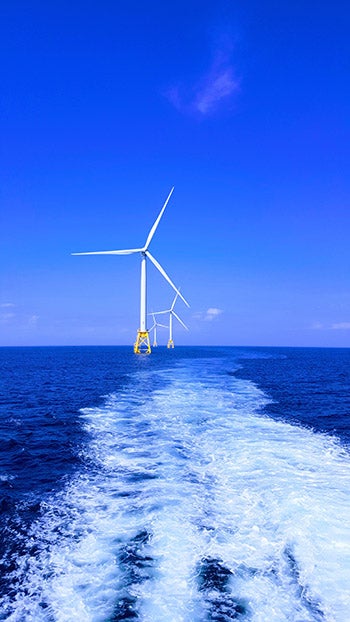Center for Ocean Leadership to support research into impacts of offshore wind energy on wildlife in U.S. Atlantic waters
COL partners with the Regional Wildlife Science Collaborative for Offshore Wind
Nov 13, 2023 - by Laura Snider
Nov 13, 2023 - by Laura Snider
The Center for Ocean Leadership (COL), a community program of the University Corporation for Atmospheric Research (UCAR), has established a partnership with the Regional Wildlife Science Collaborative for Offshore Wind (RWSC) to facilitate research related to offshore wind and wildlife in U.S. Atlantic waters.
Offshore wind energy is a major focus of efforts to increase renewable energy. As of mid-2023, state policies aim to procure 42 gigawatts of offshore wind capacity by 2040. The Biden administration has set a national goal of deploying 30 gigawatts of offshore wind by 2030 and 15 gigawatts of floating offshore wind by 2035.

While offshore wind energy can be an important source of clean energy, it also has the potential to impact marine ecosystems. To address this, the Biden administration has committed to developing offshore wind in a way that protects biodiversity. To better understand potential impacts, offshore wind companies developing projects are required to provide funding for research and monitoring as part of their lease agreements.
The RWSC — a unique collaboration among U.S. federal agencies, Atlantic Coast states, offshore wind companies, and environmental nonprofits — was formed in 2021 to coordinate offshore wind and wildlife research, data collection, and data management with the research community.
To help manage funding related to these research projects, RWSC established a memorandum of understanding with COL. As a part of UCAR, COL has robust capabilities for administering, disbursing, and tracking research funds.
“This partnership is a wonderful opportunity for helping manage a critically important ocean science effort to support sustainable, renewable offshore energy,” said Andrew Rosenberg, COL’s senior advisor.
COL became a UCAR Community Program last year to support the ongoing work of the ocean science community. COL is a convener and coordinator for ocean science, working with more than 85 affiliated institutions and federal agencies. COL-affiliated institutions span the academic, industry, and nonprofit sectors engaged in ocean science, technology development, and public education.
“Our work with RWSC to facilitate the research needed to fill gaps in our understanding and answer critical science questions about impacts to marine ecosystems is a great example of the value COL brings to the ocean science community,” said COL Director Sonya Legg. “I am thrilled that COL is able to contribute to this important research effort.”
Last summer, RWSC released a Draft Science Plan to guide future coordination of wildlife data and research collection to better understand and avoid potential impacts from offshore wind development. Hundreds of scientists and experts contributed to the plan by identifying data gaps and research needs related to wildlife and marine ecosystems. RWSC received additional input on the draft during a 90-day public comment period and expects to finalize the plan by the end of the year.
“Through this new partnership with COL, RWSC will continue its work with scientists and stakeholders to develop and implement the Science Plan,” said Emily Shumchenia, RWSC’s director. “We are thrilled to be working with COL to help launch RWSC’s research program to advance regional data collection and produce research results that are critical to environmentally responsible offshore wind development.”
UCAR is a nonprofit consortium of 126 North American universities granting degrees in atmospheric and related fields in Earth system sciences. It manages the NSF National Center for Atmospheric Research on behalf of the National Science Foundation. UCAR also hosts a suite of programs, called UCAR Community Programs, that provide service and support to the academic community. Any opinions, findings and conclusions or recommendations expressed in this material do not necessarily reflect the views of the National Science Foundation.
RWSC is co-hosted by the Northeast Regional Ocean Council (NROC) and Mid-Atlantic Regional Council on the Ocean (MARCO). RWSC’s annual work plan is funded by financial contributions and in-kind support from NROC, MARCO, and the four sectors. NROC and MARCO are the two Regional Ocean Partnerships on the U.S. Atlantic coast and are federally authorized to promote coordination among various government agencies and collaboration related to shared priorities, thereby reducing duplication of efforts, and maximizing opportunities to leverage support.